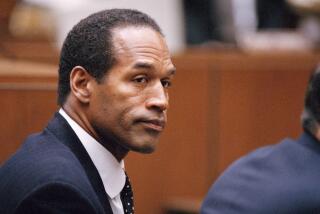CITIES / OUTCRY IN PHOENIX : Black Community in a Furor Over Death Seen as Lynching
- Share via
PHOENIX — It wasn’t former Gov. Evan Mecham’s canceling of the Arizona holiday that honored the late Dr. Martin Luther King Jr.
Nor was it his declaration that the civil rights leader just wasn’t deserving of a national holiday.
What has mobilized and unified this city’s black community like never before was the death this summer of Rick Rankins, a 43-year-old with a reputation for writing bad checks.
“This is the biggest thing in Phoenix history--honestly--as far as the black community is concerned,” according to Perry Ealim, who has actively protested Rankins’ death.
Rankins, who was black, was killed July 10 when his voice box was crushed during a scuffle with a grocery store manager and four others outside a Smitty’s supermarket.
To Marvin Davis, the Anglo manager who, with a Latino assistant, faces a manslaughter charge in connection with Rankins’ death, the struggle was a justifiable one in which he acted to save his life. But, to many in the black community--about 50,000 people or 5% of the nearly 1 million population--the event was tantamount to murder.
“It was a lynching,” Ealim maintains. “All they needed was a tree.”
Umar Sharif, assistant minister of the local branch of the Nation of Islam, agreed that the slaying fits the traditional definition of a lynching--a group’s killing or injuring a suspect without due process.
Police reports and interviews show that, when Rankins entered the store, Davis recognized him as a man who allegedly had passed two bad checks. After Rankins apparently realized he was being watched, he walked out.
Davis followed, telling Rankins to leave and never return. The manager says Rankins entered a cab and told a female companion to get a gun. Police later learned that there was no weapon.
The store manager put Rankins in a chokehold while others helped restrain him, tied him up and sat on his chest. Witnesses told police that Rankins appeared to lapse into unconsciousness, but officers decided he was faking his semiconscious state. After struggling to free him of his tightly knotted bonds, they handcuffed him and placed him in a patrol car until paramedics arrived.
Rankins never regained consciousness and died an hour later.
Sharif said that, within hours of hearing about Rankins’ death, his organization--the Muslim sect led by Louis Farrakhan--contacted the National Assn. for the Advancement of Colored People.
“We saw a need to mobilize to address this problem or at least get answers to specific questions,” he said.
What resulted, according to Sharif and the Rev. Oscar Tillman of the state NAACP, was a nationally unprecedented joining of the two groups.
While the outcry over the killing of Rankins has come from a cross section of the community, the black population has been particularly outraged.
Cloves Campbell, who for 20 years has been publisher of the Arizona Informant, a weekly newspaper for blacks, said the killing was the biggest story ever for the publication, one that prompted a deluge of letters, calls and subscription orders.
Since the death, members of the black community have demonstrated, called for boycotts and sought government intervention.
Tillman said the reaction to Mecham’s remarks and to the continuing controversy over the Martin Luther King holiday, which was canceled in 1987, were far less intense than the emotional impact generated by Rankins’ death.
“Every moment I am breathing, to anyone who will listen, I will tell them I’m not going to let Rick Rankins pull together a city (and then be forgotten),” Tillman said.
Sharif said the ultimate impact of Rankins’ death and the pending manslaughter cases remains to be seen. The incident could be remembered as a flare-up of unrest, he said, or it could be the beginning of a long struggle for social change.
More to Read
Sign up for Essential California
The most important California stories and recommendations in your inbox every morning.
You may occasionally receive promotional content from the Los Angeles Times.













